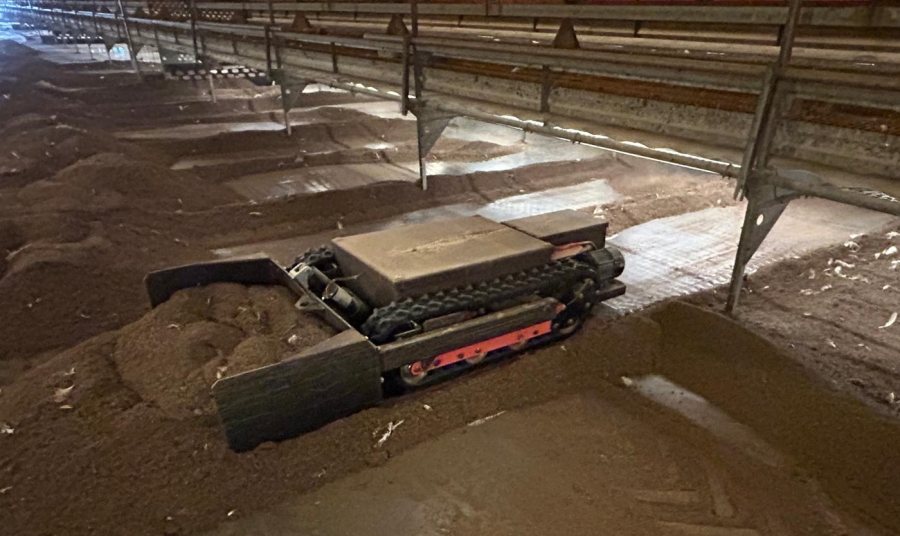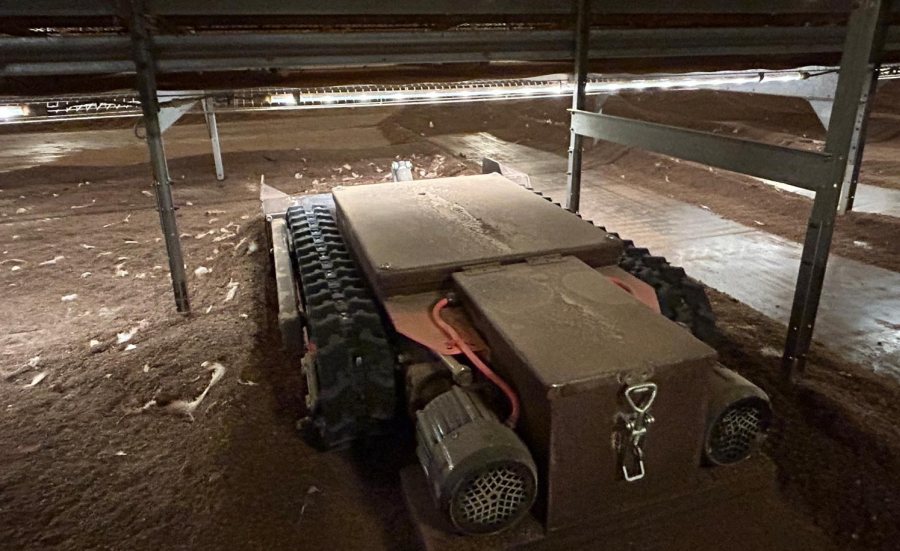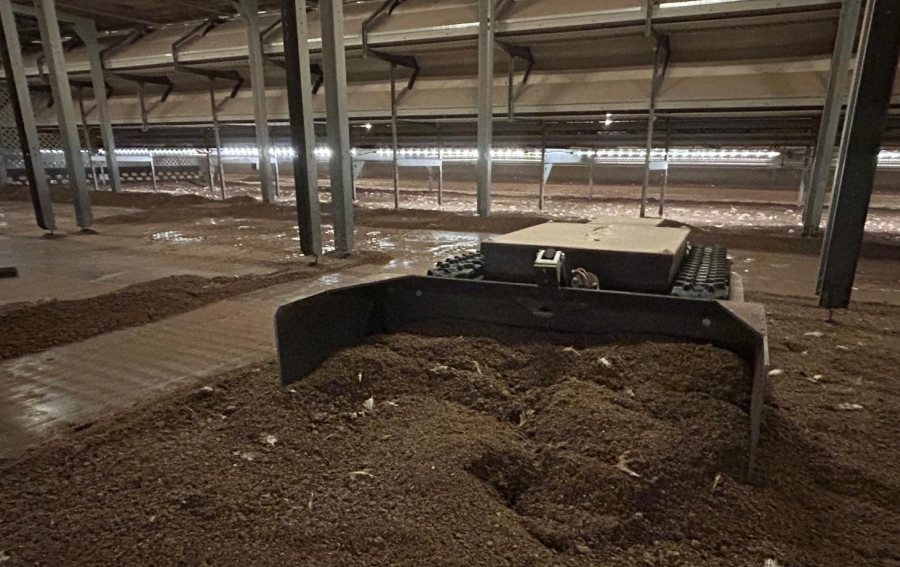
A Yorkshire agri-tech firm has developed an impressive remote controlled robot that cleans under multi-tier free range systems, reducing manual labour and saving time.
George Wilkinson, based near Richmond in North Yorkshire, has developed a series of inventions as part of his firm Precision Cleaning, set up in 2017.
Although not from a farming background himself, he found his way into the industry when he started working on a dairy farm in 2004.
Over time he worked on a variety of different farms including a free range site: “When I was working there, I got a really good understanding of how free range egg farms operate," he said.
"I started to notice that given how efficient the egg sector had become compared to other areas of farming, the turn around process between flocks always seemed to be problematic.
"There was only one major cleaning firm operating in the area at the time and so I started to consider the idea of doing it myself”.
In September 2017 George took the plunge and purchased three washers. He was able to grow the business quickly and had success until he hit a difficult period post-pandemic.
“When I first set the business up, I was amazed at how well it went and how quickly we were able to grow”, he explained.
“Then when Covid hit we were able to continue without any major problems and were able to find a good number of high quality staff due to the lack of employment in other areas.
"However, when the economy started to open up again, we began to lose some really good workers who we struggled to replace.
"This meant scaling back the business by focusing on work that was closer to home and slowly rebuilding again”.
Now that George has built the business back to where it was prior to the pandemic, he has been able to spend more time finding ways to make his operation as efficient as possible.
Innovation
The difficulty of finding staff following Covid gave George the idea of developing a machine that can clean out underneath multi-tier systems, reducing the manual labour required by workers.

He explained: “I began by creating a hydraulic puller for mucking out which I designed for use under a multi-tier system, but it has also proved to be very effective under flat deck nest boxes as well”.
“I always said that I did not want to use machines to clear under systems because I thought there was a high risk of damage, but the problem of finding staff led me to creating the puller.
"It does require a skilful operator, however it is an effective machine that removes all litter, both loose and capped”, he said.
“We used it on every job we did and were going to develop it further by creating a multi-stage ram, but decided to pursue other ideas rather than invest more time and money in mechanical attachments”.
Robotics
Despite the success of the hydraulic puller, George fell upon the idea of creating a completely new robot for the job.
“We were getting on well with the puller but with more and more things becoming electric and battery powered I thought it might be a good idea to embrace the technology make a robot. I am really pleased with it as an invention.
"Due to its small size it is far easier to use than the puller and far safer given that now only one person is needed in the shed and one person on the loader.
"Although a 32,000 bird multi-tier still takes two days to muck out and blow down, we have reduced the workload from five men per day down to two.
"Massively reducing working hours, the intensity of the work and the risk of potential accidents due to less people working around machinery”.
George added that whilst the robot has proved to be transformative, the hydraulic puller is still a useful tool for them, particularly on sheds where the litter is badly capped.
It was only in January this year that the completed robot was first put into action, but they have already been grabbing attention and a number of people have asked about the possibility of buying the robots.
George explained that, although originally built to benefit his own business, due to high interest in the robot and other inventions, he has started a sister company called ‘Precision Engineering’ to produce and sell his ideas with many more labour-saving concepts in the pipeline.

Washers
Whilst the robot is certainly the highlight of George’s inventions, he has developed other ideas to help make his operation as pleasant as possible to work on.
He said: “We have moved over to using electric washers. Working on the washers is not a nice job at the best of times and that can sometimes be compounded by how loud they are.
"We used to use a combination of big three-cylinder diesel washers and smaller single cylinder ones but now we have combined the two types of washers into one electric set up that can be sent to do any job.
"It also makes for a far better working environment, you can be stood next to the washer and have a conversation now”.
George also explained that the washers can be powered using renewables: “At the moment we use silent running generators on the trailers to power the electric washers, however they use three phase power which means that on sites where there is enough solar or wind we are able to use power from the farm.
"This helps us reduce our emissions and makes it more straightforward to calculate our carbon footprint when the time comes for us to”.
Hose Reels
In another bid to improve the working environment for his staff, George has invented a custom-made hose reel that makes it easier to access sheds with the washers.
He said: “A problem we were having with the previous set up was that we could rarely get parked in exactly the right spot to lay out the hoses for washing. It seems like quite a minor issue, but it made going round corners and doors a two-man job.”
“As a solution we came up with a bespoke hose reel that can be turned and fixed in any direction, meaning you can lay out the hoses more easily.
"Moveable hose reels are available to buy from a range of places, but we struggled to find one that made best use of the space on the trailers and carried enough hose which is why we designed a bespoke one.
"This is not a massive game changer, but it is another small change that has helped us to make the job easier and the process more efficient”.
Future plans
George is pleased with the impact of his inventions on the business but still sees it as important to keep moving forward. He said that his next step is not mechanical but instead based around an app that he believes will help future proof his business.
“The idea is for an app that provides a digital job sheet for our washing teams to work through when they are completing a job.
"When we get a customer come to us with a job, we will agree upon the tasks that need to be completed and then when the team have worked through the jobs both us and the customer will be sent a signed job sheet confirming that the work has been finished to the expected standard.
"It will be a way of ensuring that every job is consistently done to the same standard”.
George is already developing the app and is hoping that it will be up and running in the next six months.
“Apps like this are quite commonplace in other areas but it will be a relatively new development for the washing industry.
"It is important for us to have quality assurance like this, particularly when working with big businesses, and we believe it will help us remain an efficiently run business into the future”.
